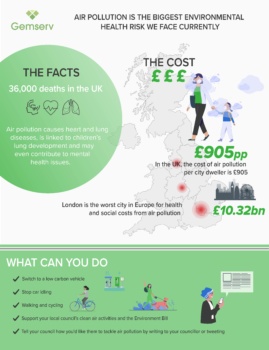Thursday 17th June is Clean Air Day – a day that brings people together to talk about the practical things we can all do to tackle the problem of air pollution.
What is Air Pollution?
Air pollution is the presence of anything in the air that could harm people’s health and is a major cause of diseases like asthma, lung disease, stroke and heart disease. Estimated to cause forty thousand premature deaths each year, which equates to around 8.3% of deaths, it is also recognised by the UK Government and World Health Organisation (WHO) as the largest environmental risk to public health.
 How Bad is Air Pollution in London?
How Bad is Air Pollution in London?
London is the worst city in Europe when it comes to health and social costs from air pollution, spending £10.32bn a year. These costs are well above other European cities such as Bucharest (£5.75bn), Berlin (£4.75bn), Warsaw (£3.83bn), Rome (£3.76bn) and Paris (£3.18bn). In the UK, the cost of air pollution per city dweller is £905, representing 2.7% of average annual income. London tops the list of UK cities with costs of £1,173 per person1.
It isn’t just London that suffers from air pollution in the UK. Manchester and the West Midlands have the 15th and 19th highest costs relating to air pollution among the 432 European cities analysed2.
Why We Are Supporting Clean Air Day?
With our head office located in London, Gemserv is committed to raising awareness of the impacts of air pollution and to playing our part in tackling it. We are proud to be working in the Electric Vehicle (EV) and Hydrogen Fuel Cell Electric Vehicle (FCEV) sector to empower the strategic and informed decision making for the deployment of infrastructure in the UK as a prerequisite for the successful transition away from fossil fuel cars to low carbon vehicles that will drive air quality improvements.
How Can You Get Involved?
We need to join hands with other businesses and individuals to offer support and guidance to decision markets and to influence change on a local and national scale. These changes will protect the health of the vulnerable, allow children to learn more effectively and improve our collective mental health as we spend longer outside exercising and enjoying nature, among many other benefits.
You can also use the Air Pollution Calculator to work out your individual contribution to air pollution in the UK.
What Are the Solutions?
Stop car idling – when you’re parked outside a building or you’re paused at a red light but not moving, don’t leave the car running.
Switch to walking or cycling – give up the car when you can and take a more sustainable mode of transport.
Cut Back on Unnecessary Deliveries – try to cut back on home deliveries.
Support the Environmental Bill3.
Help us Spread the Word
Use your voice and share your support by sharing this blog and information using, the hashtag #CleanAirDay.
Footnotes
[1] https://www.theguardian.com/environment/2020/oct/21/london-the-worst-city-in-europe-for-health-costs-from-air-pollution
[2] https://www.theguardian.com/environment/2020/oct/21/london-the-worst-city-in-europe-for-health-costs-from-air-pollution
[3] Legally binding air quality limits, including the World Health Organization annual average for PM2.5 (the smaller particulate) of 10 µg/m3 by 2030, with an interim target of 12 µg/m3 by 2025. A requirement that the Government reports each year on how it is improving indoor and outdoor air quality


